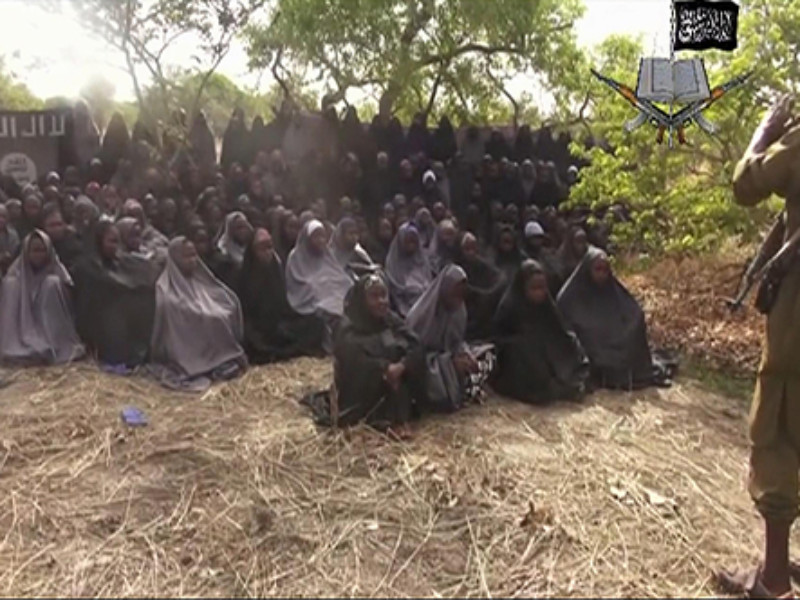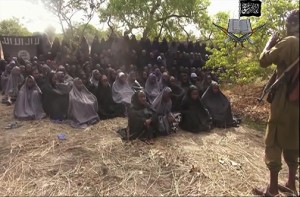
Boko Haram demands release of fighters for girls (Pictures and video)

In this photo taken from video by Nigeria’s Boko Haram terrorist network, Monday May 12, 2014 shows the alleged missing girls abducted from the northeastern town of Chibok. The new video purports to show dozens of abducted schoolgirls, covered in jihab and praying in Arabic. It is the first public sight of the girls since more than 300 were kidnapped from a northeastern school the night of April 14.

LAGOS, Nigeria (AP) — Under the guns of their captors, dozens of barefoot girls sat huddled together wearing gray Muslim veils as they chanted Quranic verses in Arabic. Some Christians among them said they had converted to Islam.
“I swear to almighty Allah, you will not see them again until you release our brothers that you have captured,” the leader of the Boko Haram terrorist network threatened, an assault rifle slung across his chest.
http://youtu.be/BZDDumeyvls
A video released by the group Monday offered the first public glimpse of what it claimed were some of the nearly 300 Nigerian schoolgirls kidnapped a month ago. The girls’ plight has spurred a global movement to secure their freedom.
It is not known how many suspected Boko Haram members are detained by security forces. Hundreds were killed last month when leader Abubakar Shekau’s fighters stormed the military’s main northeastern barracks in Maiduguri, the terror group’s birthplace and the headquarters of a year-old military state of emergency to put down the 5-year-old Islamic uprising.
In the video, two of the girls were singled out for questioning.
“Why have you become a Muslim?” one girl, who looked to be in her early teens, was asked.
“The reason why I became a Muslim is because the path we are on is not the right path,” the girl said, nervously shifting her body from side to side, her eyes darting back and forth.
“We should enter the right path so that Allah will be happy with us,” added the girl, who said her name had been changed to Halima because she had converted from Christianity to Islam. Like the other girls, she wore a bulky gray hijab that covered her body from head to toe, revealing only her face.
A second girl, who appeared to be in her mid-teens, was asked if she or any of the others had been mistreated. No, she said, adding that they had experienced nothing “except righteousness.”
As the girls chanted Islamic verses, some clasped their hands together in what appeared to be the Christian style of prayer before quickly turning their palms upward, as Muslim worshippers do.
The girls’ families have said most of those seized April 15 from a school in the northeastern town of Chibok are Christians.
It was impossible to fully authenticate the video, though parents were trying to turn on a generator in Chibok, hoping to watch the video and identify their daughters, said a town leader, Pogu Bitrus.
“There’s an atmosphere of hope — hope that these girls are alive, whether they have been forced to convert to Islam or not,” he told The Associated Press by telephone. “We want to be able to say, ‘These are our girls.'”
The video showed about 100 girls, indicating they may have been broken up into smaller groups as some reports have indicated.
Fifty-three girls managed to escape and 276 remain missing, police say.
Bitrus said vegetation in the video looked like the Sambisa Forest, some 20 miles (30 kilometers) from Chibok, where the girls were believed to have been spirited away.
In Washington, White House spokesman Jay Carney said U.S. intelligence experts were “combing over every detail” of the latest recording. He said administration officials have seen the video and “have no reason to question its authenticity.”
A Nigerian government statement said it was reviewing the video and would “continue to explore all options for the release and safe return of our girls back to their homes.”
In a video last week, Shekau threatened to sell the girls into slavery. It arrived amid unverified reports that Christians among the students had been forced to convert to Islam and that some were taken to neighboring Cameroon and Chad, where they were forced to marry their abductors. Boko Haram means “Western education is sinful.”
The latest video, obtained by The Associated Press, came through channels that have provided previous messages from Shekau, who spoke in the video in the Hausa language of northern Nigeria. Wearing camouflage fatigues, he clutched an assault rifle in the footage, which was imprinted with the Boko Haram insignia — a Quran resting on two crossed assault rifles — and below a black jihadi flag.
The United States put a $US7 million ransom on Shekau last year.





















